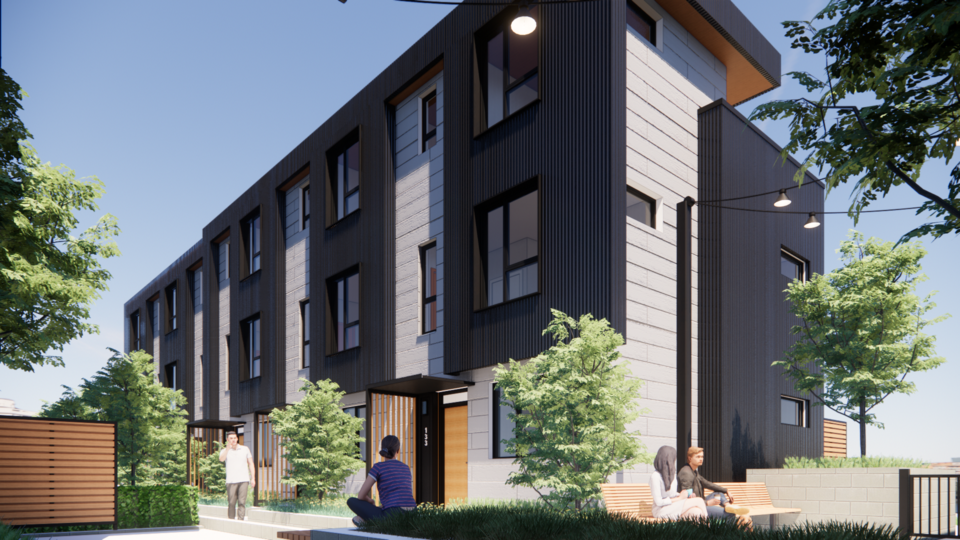The federal government has waived the goods and service tax (GST) on new rental construction, easing the pain of higher lending rates for rental developers offered via Canada Mortgage and Housing Corp.-insured loans.
The GST break, which amounts to about $25,000 on a $500,000 new rental apartment, is expecting to boost rental construction in B.C. and across Canada.
Toronto-based Dream Unlimited credited the removal of the GST as key to its new campaign to build 5,000 rental apartments, with the first projects in Ottawa, Saskatoon and Calgary.
“What this legislation unlocks is our ability to get shovels into the ground quickly at a time when it’s never been more critical to build new homes,” said Michael Cooper, Dream’s president and CEO.
In B.C., PC Urban Properties is working with Fiera Real Estate, to bring 141 rental homes, including 12 townhomes, to South Vancouver, leveraging both the GST break and the City of Vancouver’s commitment to speed rental construction permits.
“Actions like the elimination of GST on new rental buildings and speed of approvals will help alleviate our housing crisis,” said Brent Sawchyn, CEO of PC Urban, who was a strong proponent for ending the GST on rental construction.
The applies to projects that start construction between September 14, 2023, and December 31, 2030, and complete by December 31, 2035, providing support for projects in the planning process and development.
Mark Goodman of Goodman Commercial Inc., Vancouver, while welcoming the generous construction start times of seven years and completions within 12 years, noted the GST exemption for rentals was first promised by the Trudeau government in 2015.
In the first nine months of this year, 6,221 purpose-built rental apartments were started in Metro Vancouver, up from 5,349 during the same period in 2022, and the GST exemption is expected to boost those numbers over the rest of the year, according to industry sources.
Townline, an already large rental developer in the region, plans to increase rental construction due partly to the tax exception, as one example.
The federal government also provides incentive financing for rental construction, but lending rates have doubled over the past 18 months, though they remain a relative bargain in commercial or residential real estate financing.
Rental construction financing
In September, the federal government a significant increase in the annual limit for Canada Mortgage Bonds from $40 billion to $60 billion – unlocking $20 billion in new financing to facilitate the construction of an additional 30,000 rental apartments per year.
The additional financing is designated for multi-unit rental projects, including apartment buildings, student housing and senior residences.
There are two CMHC products rental housing developers can apply for.
One is the Rental Construction Financing Initiative (RCFI) loan, which provides low-cost funding during development of rental apartments. The minimum loan is $1,000,000, and a maximum of up to 100 per cent of loan to cost. The interest rate is fixed at the time of the first construction draw.
The other product is the MLI Select loan. It is a new a multi-unit mortgage loan insurance product from CMHC. Designed for both new construction and existing properties, the program has a focus on energy efficiency, affordability and accessibility, including restrictions on rental rates.
Unlike RCFI loans where the interest rate is fixed, MLI Select loans are typically variable, so the rate will move with prime during the term of the loan. Pricing on MLI Select construction loans will depend on the strength of the borrower and size of the loan.
Current lending rates for RCFI loans, which are tied to the Canada Government Bond rates, are currently in the range of 3.75 per cent, according to James Paleologos of Realtech Capital Group Inc. in Vancouver.
MLI Select construction loans floats below the prime rate (7.20 per cent) and are now available at around 5 per cent, Paleologos explained.
While these rates appear low, they are much higher than in the spring of 2022 before the Bank of Canada began increasing the bank rate. In February 2022 the RCFI loans were available for 2.3 per cent, less than half the rate today.



